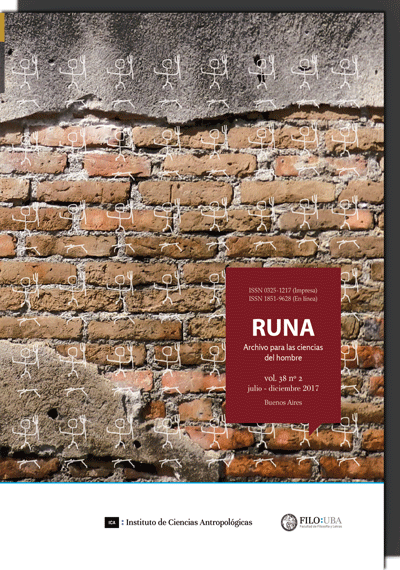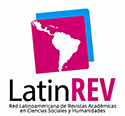Maternity, care and punishments in marginal and vulnerable neighborhoods from Buenos Aires
Abstract
Based on ethnographic research done on the period 2009-2015, this paper describes and analyzes smacking as a part of the care practices mothers in everyday life. Considering motherhood as a social, cultural, economic and subjective phenomenon, in this text, I analyze the intertwining between care, corporal punishment and violence. Specifically, I address the relationship between mothering in women living in slums and poor neighborhood. The two areas that make up the analysis are: a) the boundaries between acceptable and punishable smacking; b) the relationship with state bureaucracies, its limits and logics.Downloads
References
Auyero, J. y F. Berti. (2013). La violencia en los márgenes. Buenos Aires: Editorial Katz.
Badinter, E. (1991). ¿Existe el amor maternal? Barcelona: Paidós.
Bourdieu, P. y L. Wacquant. (1992). In invitation to reflexive sociology. Chicago: The University of Chicago Press.
Bourgois, P. (2009). “Treinta años de retrospectiva etnográfica sobre la violencia en las Américas”. En Lopez García, Santos y Camus (ed.). Guatemala. Violencias desbordadas. Córdoba: Universidad de Córdoba.
Castilla, M.V. (2014). Maternidad y política social. Población & Sociedad. Vol. 21, N°1, 33-59.
DiQuinzio, P. (1999). The impossibility of motherhood: feminism, individualism and the problema of mothering. London-New York: Routledge.
Elías, N. (1989). El proceso de civilización. Investigaciones sociogenéticas y sicogenéticas. México: Fondo de Cultura Económica.
Esping-Andersen, G. (2001). Los tres mundos del estado de bienestar. Valencia: Edicions Alfons El Magnánim.
Farmer, P. (2003). Pathologies of power. Health, human rights and the new war on the poor. Berkeley: University of California Press.
Fuster, F. García y G. Musitu Ochoa. (1988). Maltrato Infantil: Un Modelo de Intervención desde la Perspectiva Sistémica. Cuadernos de Consulta Psicológica. Vol. 73, N° 4, pp. 73-82.
Galtung, J. (2003). Tras la violencia, 3R: reconstrucción, reconciliación, resolución. Afrontando los efectos visibles e invisibles de la guerra y la violencia. Gernika: Bakeaz/Gernika Gogoratuz.
Garriga-Zucal, J. y G. Noel. (2010). Notas para una definición antropológica de la violencia: un debate en curso. Publicar en Antropología y Ciencias Sociales VIII (IX): 98-121.
Harvey, P: (1999). “El poder seductor de la violencia y de la desigualdad”. En A. Isla (ed.). Identidad y terror en América Latina. Brasil.
Isla, A. (2006). “Violencias públicas y privadas en la producción de familia y género”. En: D. Miguez y P. Semán (eds.). Entre santos, cumbias y piquetes. Las culturas populares en la Argentina reciente. Buenos Aires: Editorial Biblos.
Izquierdo, M.J. (1998). “Los órdenes de la violencia: especie, sexo y género”. En Fisas Vicenc (ed.). El sexo de la violencia. Género y cultura de la violencia. Barcelona: Icaria.
Kalinsky, B. y O. Cañete. (2010). Madres frágiles: un viaje al infanticidio. Buenos Aires: Editorial Biblos.
Korbin, J. (1977). Anthropological cuntributions to the study of child abuse. Child Abuse and Neglect. The International Jounal. l(l):7-24.
O´Donnell, G. (1993). “Estado, democratización y ciudadanía”. Revista Nueva Sociedad. Nº 128, 63-87.
Osborne, R. (2010). Apuntes sobre violencia de género. Barcelona: Edicions Bellaterra, Serie General Universitaria.
Palomar Verea, C. (2004). “Malas madres: la construcción social de la maternidad”. Debate Feminista. Vol. 30, 12-34.
Rich, A. (1996 [1976]). Nacemos de mujeres: la maternidad como experiencia e institución. Madrid: Cátedra.
Scheper-Hughes, N. (1997). Muerte sin llanto. Violencia y vida cotidiana en Brasil. Barcelona: Editorial Ariel.
Scheper-Hughes, N. and A. Lovell. (1987). Psychiatry Inside Out: Selected Writings of Franco Basaglia. New York: Columbia University Press.
Scheper-Hughes, N. y P. Bourgois. (2004). Violence in war and peace: An Anthropology. Oxford: Wiley-Blackwell.
Sjoberg L & C. Gentry. (2007). Mothers, monsters, whores. Women´s violence in global politics. London: Zed Books.
Tarducci M. (2011). “Las ‘buenas’ y ‘malas’ madres de la adpción”. En K. Felitti (coord.). Madre no hay una sola. Buenos Aires: Ciccus.
Tarducci, M. (2008). Maternidades en el siglo XXI. Buenos Aires: Espacio.
Taussig, M. (1984). “Culture of terror space of death: Roger Casement’s Putumayo Reports and the explanation of torture”. Comparative Studies in Society and History, 26(3).
UNICEF. (2013). Encuesta sobre condiciones de vida de la niñez y la adolescencia. Principales resultados. Buenos Aires: UNICEF.
Welldon, E. (2004). Mother, madonna, whore. London: Karnac Books.

Runa, archivos para las ciencias is a publication of the Instituto de Ciencias Antropológicas, Facultad de Filosofía y Letras, Universidad de Buenos Aires and is distributed under a Creative Commons Attribution 4.0 International License.
Runa maintains its commitment to the policies of Open Access to scientific information, considering that both scientific publications and publicly funded research should circulate on the Internet freely, free of charge and without restrictions.
The contents and opinions expressed in published articles are the sole responsibility of their authors.



















